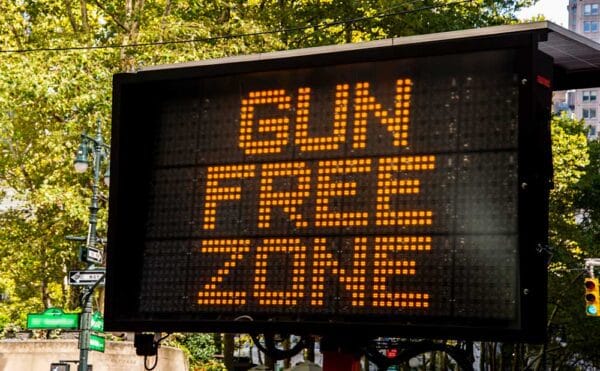
The controversial Gun Free School Zone case, where Gabriel Metcalf has been in pre-trial detention for a month, has a detention hearing scheduled for 9 a.m. Thursday morning, September 21, 2022.
Russel Hart, the federal public defender for Gabriel Metcalf, asked for the hearing, citing new evidence that was not available at the first detention hearing. Shortly after Gabriel’s arrest, seemingly by an ATF/Billings Police Task Force, the hearing took place. The prosecuting attorney, Assistant United States Attorney Thomas K. Godfrey, had opposed the re-opening of the detention hearing. Godfrey indicated to Judge Cavan that he had sufficient information and that they offered no significant new information.
In this case, the hearing will likely have occurred by the time AmmoLand publishes this writing. Posting official results takes some time. We expect the results to be available by Friday evening.
The maximum penalty for possessing a firearm in a federal Gun Free School Zone is five years in prison. The statute says there can be a fine of up to $5,000. The initial press release by the United States Attorney’s office states the fine could be up to $100,000. Criminal penalties are complex, with many enhancements possible. Gabriel Metcalf’s case appears to be a simple, single count of possession of a firearm in a federal Gun Free School Zone outside of private property.
Much about the Gun Free School Zone law is unusual and peculiar. One paragraph states that they will treat the Gun Free School Zone offense as a Misdemeanor, with the exception of the potential five-year sentence. From 18 U.S.C. §924. Penalties for 922(q):
(4) Whoever violates section 922(q) shall be fined under this title, imprisoned for not more than 5 years, or both. Notwithstanding any other provision of law, the term of imprisonment imposed under this paragraph shall not run concurrently with any other term of imprisonment imposed under any other provision of law. Except for the authorization of a term of imprisonment of not more than 5 years made in this paragraph, for the purpose of any other law a violation of section 922(q) shall be deemed to be a misdemeanor.
Misdemeanors are generally treated with considerably more lenity than felonies. Russell Hart makes the case that Gabriel Metcalf has been treated considerably more severely than he deserves because incorrect information was given to the Court.
From the brief by Metcalf’s attorney, Russell Hart:
The Court now has the benefit of Doc. 15 and confirmation that Mr. Metcalf did not merely imagine the threat facing him as was stated in earlier proceeding in support of detention. He has no criminal history at 49 years of age and stands accused of a Misdemeanor offense for the first time in his adult life: the Court cannot presume Mr. Metcalf would violate any condition of release, especially one that would constitute a felony offense under 18 USC § 922(d)(1).
It will be interesting to see what the prosecution argues to imprison Gabriel Metcalf before trial.
Russell Hart does not forget the importance of the Second Amendment in this case. Hart reminds the Court the Bruen decision presumptively protects the conduct of Gabriel Metcalf as bearing arms outside of his home. This correspondent believes this preserves a Second Amendment challenge to the Gun Free School Zones Act.
The Gun Free School Zone Act was already found to be unconstitutional in 1994. Eight circuit courts have ruled on the act’s constitutionality since a change in the wording in 1996. Five have ruled the 11-word change cured the constitutional defect, and three have held the act remains unconstitutional.
In conclusion, there are several possibilities for Judge Cavan in the Metcalf case. He can keep Gabriel Metcalf in pre-trial detention, or he can release Gabriel Metcalf under the conditions outlined by Russell Hart, probably on his own recognizance. The judge can impose some form of bail or bond as a condition of release.
We will keep AmmoLand readers informed as this situation develops.
About Dean Weingarten:
Dean Weingarten has been a peace officer, a military officer, was on the University of Wisconsin Pistol Team for four years, and was first certified to teach firearms safety in 1973. He taught the Arizona concealed carry course for fifteen years until the goal of Constitutional Carry was attained. He has degrees in meteorology and mining engineering, and retired from the Department of Defense after a 30 year career in Army Research, Development, Testing, and Evaluation.

from https://ift.tt/8Yb9CVH
via IFTTT

No comments:
Post a Comment